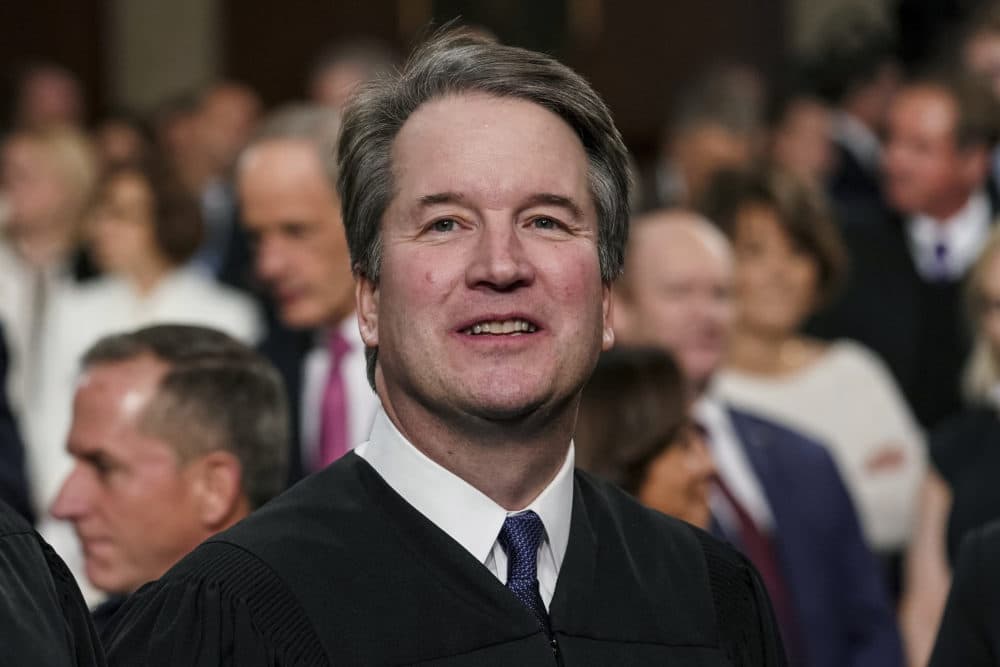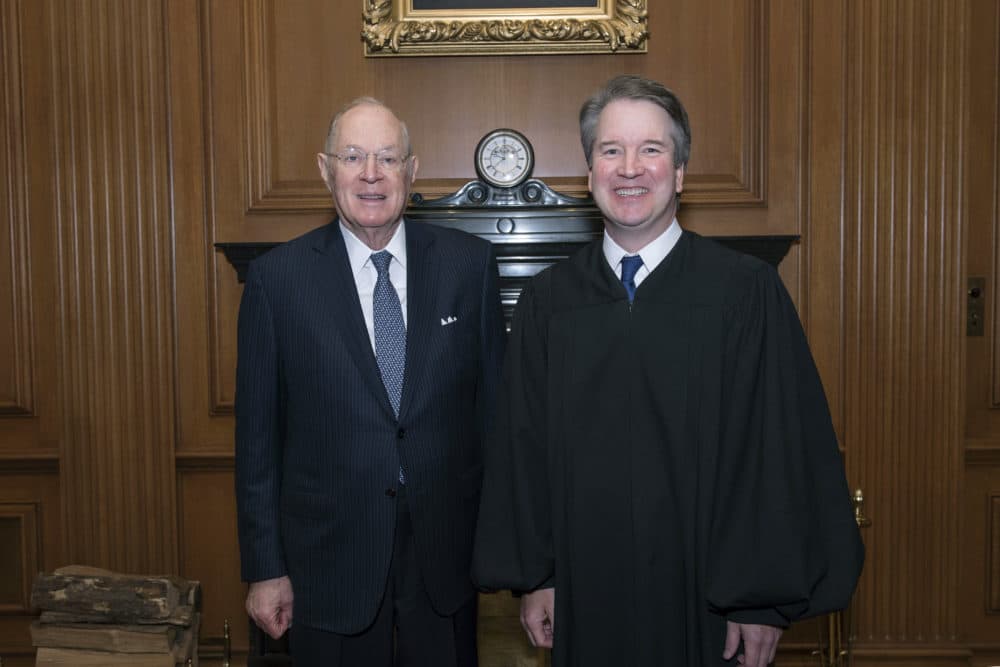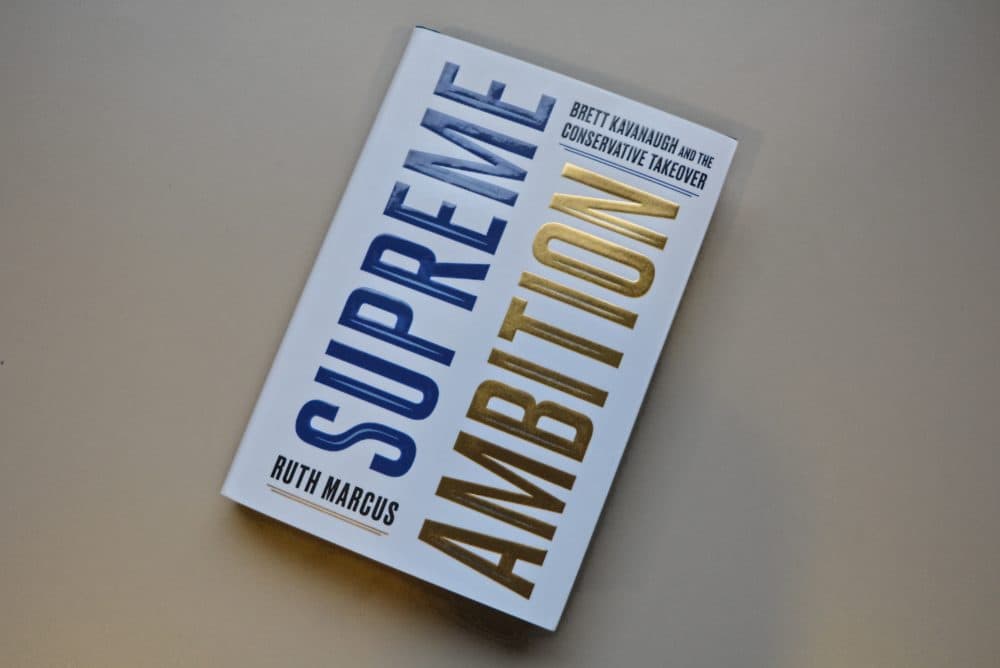Advertisement
Justice Kennedy’s Influence Helped Give Kavanaugh Supreme Court Edge, New Book Says
Resume
Supreme Court Justice Brett Kavanaugh's confirmation was a bruising and dramatic partisan battle, with Christine Blasey Ford accusing Kavanaugh of sexually assaulting her when they were in high school more than 30 years ago.
In meticulous detail, Washington Post columnist Ruth Marcus’ new book "Supreme Ambition: Brett Kavanaugh and the Conservative Takeover" describes how Kavanaugh ended up as the nominee when Justice Anthony Kennedy announced his retirement, and how Republicans have been working on getting a conservative majority on the court for decades.
In 2016, then-Republican presidential candidate Donald Trump pulled an unprecedented move: He assured potential voters with a list of conservatives he would nominate to the Supreme Court if elected president, Marcus says. Brett Kavanaugh’s name was nowhere to be found on this initial list of nominees nor on a second list released later on in 2016.
“This didn't seem to be a big deal if you were Brett Kavanaugh, because it wasn't very likely after all, that candidate Trump was going to become President Trump,” Marcus says.
But when Trump became a nominee, Kavanaugh's absence from the list became a concern for some. And because of support from major figures in Washington — from former President George W. Bush to Justice Kennedy — an alliance of Kavanaugh supporters got to work advocating on his behalf.
In a private meeting with Trump, Marcus says, Kennedy pushed for Kavanaugh to be included on an updated list of nominees. At the swearing in of Justice Neil Gorsuch, “Kennedy asked for some time alone with the president,” Marcus says, and then a few months later, Kavanaugh appeared on an expanded nominee list.
“When Justice Kennedy talked, President Trump listened because President Trump really wanted to do everything he could to encourage Justice Kennedy to step down,” she says.
Marcus says the difficulty Kennedy faced in getting Kavanaugh on Trump’s shortlist was two-fold: Kavanaugh “not only worked for President George W. Bush, he had married the president’s secretary.” To Trump, Kavanaugh “was a Bushie,” she says.
Kennedy’s unwavering support of Kavanaugh was partially ego-based, she says, since “the notion of being succeeded by his own favorite clerk really, really appealed to him.”
Kennedy also had a deep understanding of the current political environment. Although he was quite a conservative justice, he recognized the need for a Republican president to nominate a justice that differed from some of his own moderate-leaning views, such as issues relating to same-sex marriage.
“There was no chance when Justice Kennedy retired that we were going to get a Kennedy-like replacement,” she says. “He was always going to be, whoever replaced him and this is true of Justice Kavanaugh, much more like Justice [Antonin] Scalia, much more like Chief Justice [William] Rehnquist or Chief Justice [John] Roberts than like a Kennedy figure.”

Interview Highlights
On why Democrats were dealt a “bad hand” in the Kavanaugh case
“The Democrats had a bad hand, and they played it badly if their goal was to defeat Kavanaugh. And what I mean by the bad hand was that obviously they were not in the majority in the Senate. And second of all, it was in the Gorsuch hearings, the previous hearings, that Democrats had pushed Republicans to have to deploy the nuclear option so that there was no longer the possibility of a filibuster. Judge Kavanaugh only needed 50 votes to be confirmed. He didn't need 60 votes. So that's a pretty bad hand. But Dianne Feinstein, who has [an] impressive record as a senator, was not up to the task. She is the oldest senator, and to be blunt about it, that showed in the course of the hearings.”
On Sen. Dianne Feinstein’s role in the case
“Dianne Feinstein was in a very, very difficult situation when it came to Christine Blasey Ford's allegations. But what happened was Christine Ford tried to reach out to [California Rep.] Anna Eshoo even before Brett Kavanaugh was chosen as the nominee. It took a while for her to get through. Then she spoke to Anna Eshoo. Anna Eshoo called Dianne Feinstein the next morning. Sen. Feinstein said that's very serious, have her write me a letter. And Christine Ford did not hear back from anybody about this for about 10 days.

“And in fact, Dianne Feinstein had heard this remarkable allegation against this very controversial nominee, didn't even mention it to her staff. Christine Ford was very reluctant to come forward. Dianne Feinstein felt like she needed to promise Christine Blasey Ford confidentiality. That's understandable. But I write in the book that that was a pretty major decision to make without going to any of your leadership, any of your Democratic colleagues to just decide on your own that you're going to keep this explosive information to yourself, and especially because information like this has an incredible tendency to leak. And Dianne Feinstein did not plan accordingly for that. And that created the situation in which she was blamed, I think very unfairly, for leaking it and blamed somewhat unfairly for having sat on it. She was in a tough spot.”
On Brett Kavanaugh and Republican Sen. Lindsey Graham’s “outbursts” during confirmation hearings
“Both Brett Kavanaugh's outburst and Sen. Graham's outburst, for me, they had the impact of scaring me, and I came away thinking, 'Surely he can't be confirmed after that outburst.' With Republicans, the impact was precisely the opposite. It was a rallying cry for the troops, and Republicans across the country rallied for him.
On the FBI investigation into Kavanaugh
“It was not an adequate investigation. It was a dereliction of duty. And it was a dereliction of duty, not just on the part of the FBI, but on the part of the Senate. The reason for that is that Don McGahn was bound and determined, as was Mitch McConnell and others, to get Brett Kavanaugh across the finish line. So the FBI investigation, which they didn't want to happen, which they only allowed to happen when Sen. [Jeff] Flake and Sen. [Susan] Collins made clear that they were not going to go forward with a vote without an FBI investigation, the FBI investigation was only designed to satisfy those senators. It was not designed to get at the truth. It was designed to get to 50 votes. And it did its job in that sense.
“But one of the most, I thought, appalling parts of that investigation involved a man named Max Stier. Max Stier is the head of an organization here that is ironically dedicated to promoting good government. He's also a college classmate of Brett Kavanaugh's. He told people that he saw Brett Kavanaugh expose himself to someone, a woman, at a party at Yale their freshman year. Not the woman that you've heard about, Deborah Ramirez, who came forward in a story in The New Yorker, but a second woman. And Max Stier was desperate to get his information to the FBI. He enlisted the help of two former federal prosecutors with good relations to the FBI. They wouldn't talk to him. He tried to reach out to Susan Collins. She says she doesn't remember that, but he was unable to get her attention.
“Then he reached out to Sen. Chris Coons of Delaware. Sen. Coons reached out to his law school classmate, Chris Wray, the head of the FBI, and said, 'Hey, can you please interview this guy?' That didn't happen. That letter was copied to both Sen. [Chuck] Grassley and Sen. Feinstein. They didn't say, 'Hey, who's Max Stier, and what does he have to say that we should know about?' And then finally, Sen. Coons was desperate to get this information to people's attention. He reached out to Sen. Flake, who he’d been working with on the FBI investigation. Sen. Flake said, 'I can't deal with it. My family's getting death threats. I have to concentrate on that.' So I just thought this was one of the most appalling derelictions of duty that I've seen in my years in Washington.”
On Christine Blasey Ford’s father’s letter to Brett Kavanaugh’s father
“It did really happen. Just to set the scene for you, this is the day after Justice Kavanaugh's confirmation vote. And Ed Kavanaugh, who's a member of a fancy golf club here called Burning Tree, opens his email, and he finds this email from Ralph Blasey, who is a fellow member and former president of Burning Tree. And Ralph Blasey says in this email, 'Both of our families have been through a lot. I'm glad Brett was confirmed.' Now, the Blaseys, unlike the Kavanaughs, did not appear with their daughter at the hearings. Behind the scenes, though, they had been supportive of her. They went to see her at the hotel where she was staying. After the testimony, they told her they were proud of her for speaking out and telling her truth. But that's a pretty amazing sentence from a father whose daughter had accused Brett Kavanaugh of sexually assaulting her.”
On if the Kavanaugh confirmation has done lasting damage to the process
“Well, I think there's a lot of things that have done lasting damage to the process, and that would start with getting rid of the filibuster, which was a moderating influence on things.
"But also more broadly, I think we are just at a moment where there is almost no prospect of having somebody from the opposite party vote for a president's nominee. And that's one piece where actually Lindsey Graham was right. He was right to vote for Sonia Sotomayor and Elena Kagan, and it's truly terrible that we've fallen off that norm, and there's no prospect of it being returned. I can imagine a world in which you have a Democratic president and a Republican Senate or perhaps even the other way around, where vacancies remain open for years and that'd be terrible.”
On Kavanaugh’s animosity toward the Clintons and his memo to Ken Starr in 1998
“That was really both a remarkable memo and it was a remarkable moment when he invoked the Clintons in that tirade … that we were all mesmerized by. And by the way, that was not an off the cuff remark. The day before, as he was preparing his opening statement, then-Judge Kavanaugh went into his chambers, closeted with one clerk who had been a speechwriter and rewrote his opening statement and made it much more vitriolic, much more partisan to the point where he came out and looked at his lawyers who were kind of liberal Democrats, the private lawyers he hired, and he said, ‘You're not going to like some of this.’ He knew what he was doing. I think that it was the Starr experience where Starr's prosecutors were in this very pitched litigation with the Clintons. There was a lot of argument about whether, obviously, the president was telling the truth and about the content of his behavior. And it wasn't just in that memo that Brett Kavanaugh expressed this hostility toward the Clintons. I tell one story in the book about [Kavanaugh] going out on a blind date with somebody — this is during the Starr period — he started railing about the Clintons to her, even though he didn't know her and she was an assistant U.S. attorney. He kind of knew she was a Democrat. But he surprised his friends by the vitriol that he had towards the Clintons then. And obviously, it persisted.”
Julia Corcoran produced and edited this interview for broadcast with Todd Mundt. Serena McMahon and Samantha Raphelson adapted it for the web.
This segment aired on December 3, 2019.
